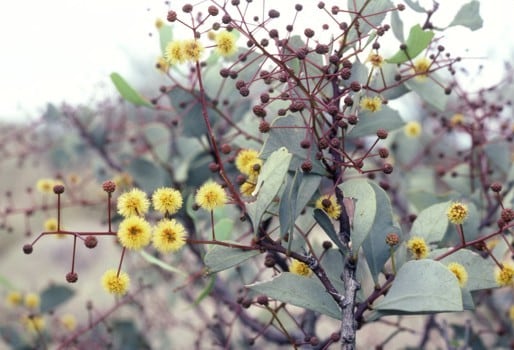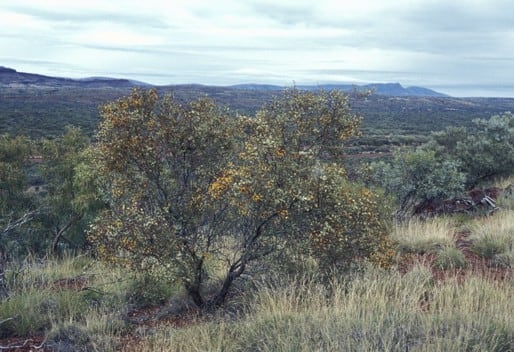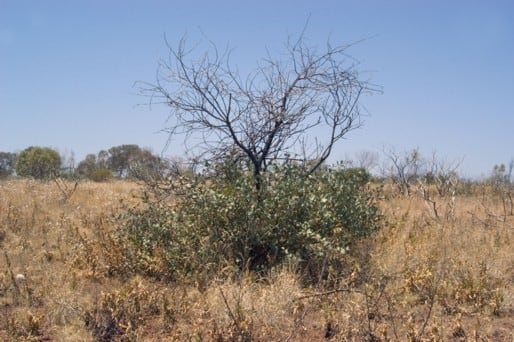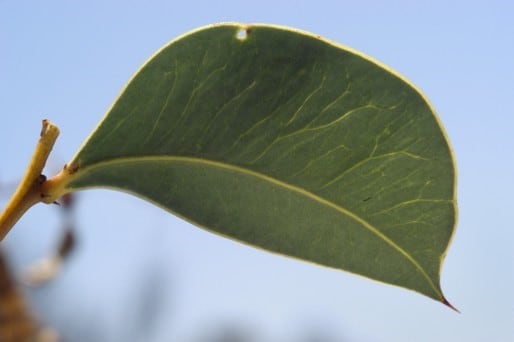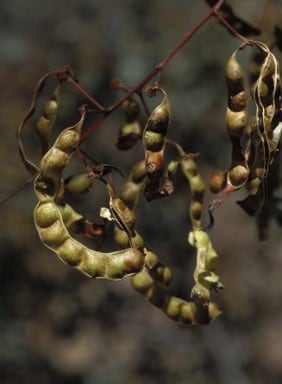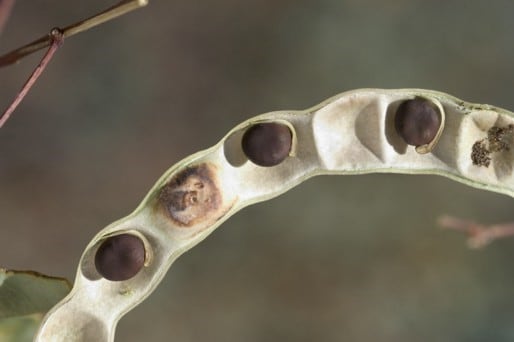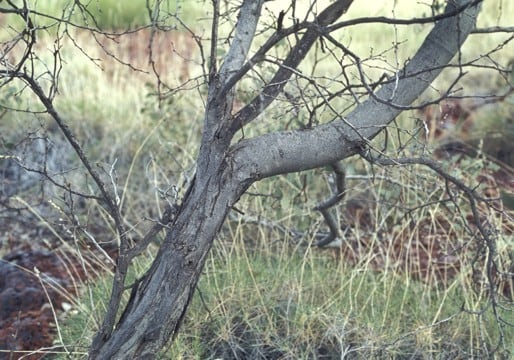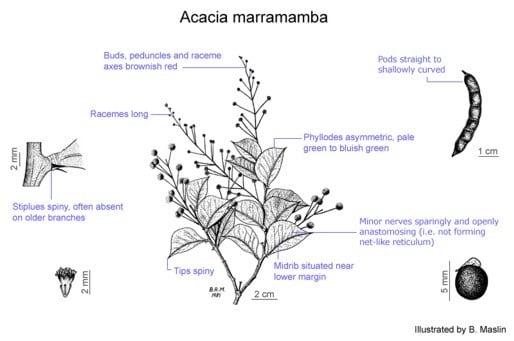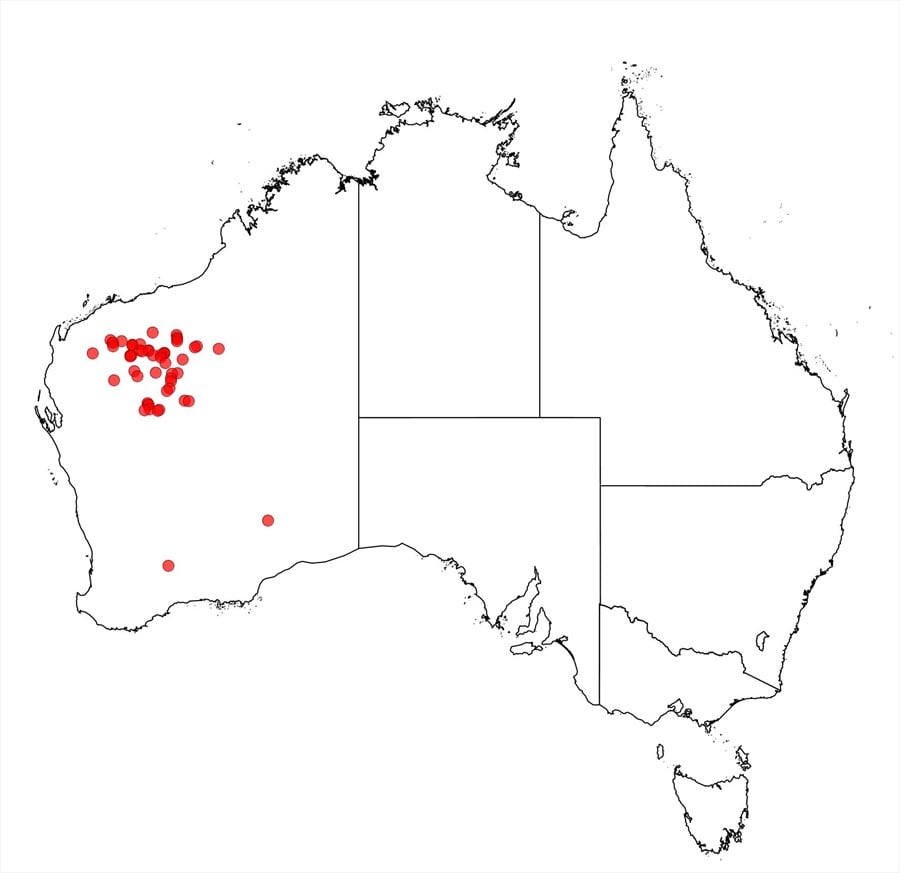Acacia marramamba Maslin
WATTLE
Acacias of Australia
Common Name
Marramamba
Family
Fabaceae
Distribution
Scattered in the Pilbara region of north-western W.A. from Duck Ck Stn E to Balfour Downs Stn, and in the adjacent Barlee Ra. and upper catchments of the Ashburton, Gascoyne and Murchison R. (as far south as Mt Fraser). Not a particularly common species and although it does not form dense populations it is generally not uncommon where it occurs.
Description
Shrubby glabrous tree 2–3 m high, sometimes to 5 m. Bark slightly fissured and fibrous towards base of trunks, otherwise smooth (not corky). Branchlets red, light brown or orange. Stipules spinose, commonly absent from mature nodes, mostly 2–4 mm long. Phyllodes inequilaterally elliptic, with a conspicuously rounded adaxial margin and almost straight abaxial margin, 2–5 cm long, 9–23 mm wide, scarcely undulate, acute to acuminate, pungent, coriaceous, pale green to subglaucous, not obviously pruinose; midrib prominent and excentric; lateral nerves obscure and sparingly anastomosing. Inflorescences racemose; raceme axes 6–15 cm long and (together with peduncles and buds) red to red-brown; peduncles twinned, 1–2 cm long; heads globular, 25–35-flowered, light golden to mid-golden. Flowers 5-merous; sepals ±free; petals red to red-brown at apices. Pods narrowly oblong, straight to shallowly curved, to 7.5 cm long, 7–9 mm wide, chartaceous to thinly coriaceous, light brown. Seeds mostly oblique, broadly elliptic to almost orbicular, dull, black, 4.5–5 mm long; funicle not encircling seeds; aril clavate.
Phenology
Flowers May.-July.
Habitat
Grows in skeletal sandy loam on rocky hills (Marra Mamba Iron Formation) in open scrub or tall open shrubland with spinifex ground cover.
Specimens
W.A.: 3 km SSW of Mt Fraser [Mt Padbury Stn], R.J.Cranfield 5719 (PERTH); Rhodes Ridge, 53.5 km NW of Newman, B.R.Maslin 4610 (K, MEL, NY, PERTH); 16 km S of Kumarina on Great Northern Hwy, B.R.Maslin 4965 (PERTH); 22 km ESE of Quarry Hill [Duck Ck Stn], K.Newbey 10707 (CANB, PERTH); Mt Augustus, K.Newbey 11707 (CANB, PERTH).
Notes
A member of the ‘A. pyrifolia group’. Phyllode shape and inflorescence structure are often similar to that of A. inaequilatera which has thick, corky bark, normally pruinose branchlets, mostly broader, closely reticulate phyllodes, purple-red racemes, peduncles and flower buds, as well as funicles which ±encircle the seeds. Also related to A. trudgeniana.
Can resprout from the base following fire.
FOA Reference
Data derived from Flora of Australia Volumes 11A (2001), 11B (2001) and 12 (1998), products of ABRS, ©Commonwealth of Australia
Author
Edited by B.R.Maslin
B.R.Maslin
This identification key and fact sheets are available as a mobile application:
URL: https://apps.lucidcentral.org/wattle/
© Copyright 2018. All rights reserved.
